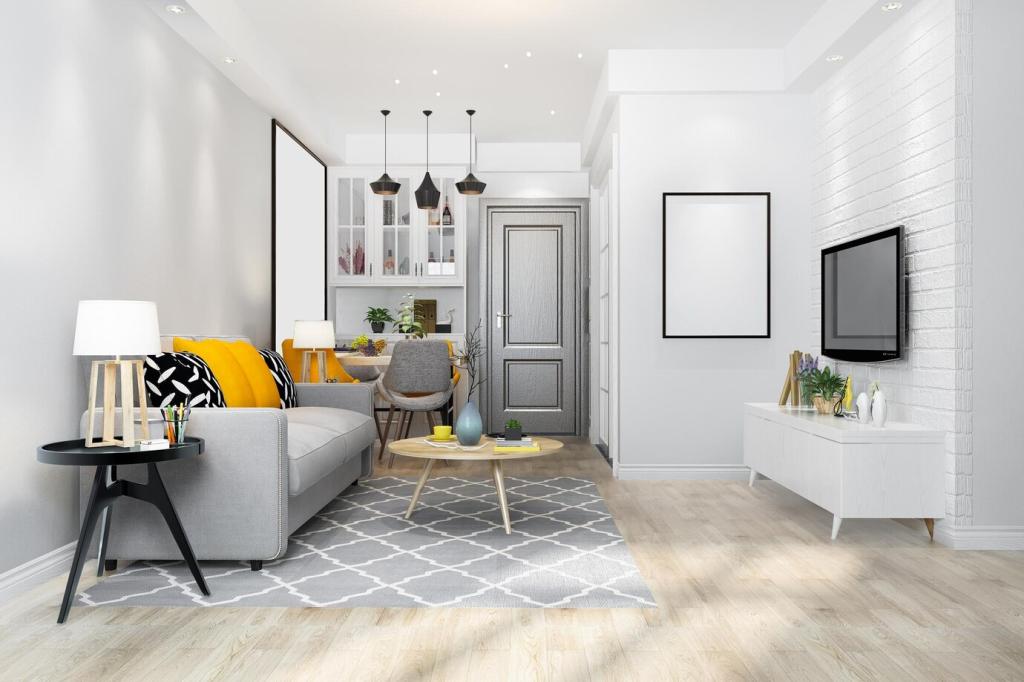Seamless Smart Home Entertainment Systems: Immerse Without Friction
Selected theme: Seamless Smart Home Entertainment Systems. Welcome to a home entertainment experience where setup fades into the background and stories, music, and games take center stage—effortless, unified, and delightfully human.

Designing a Frictionless Living Room Ecosystem
A truly seamless smart home entertainment system gives you one intuitive interface for movies, music, lights, and sound—across TV, projector, and speakers. Voice commands complement tactile remotes, while consistent icons and labels reduce confusion. Tell us your current control mix and what feels most natural to you.

Networking: The Backbone of Seamless Playback
For fixed A/V gear, wired Gigabit Ethernet is still king for reliability and low jitter. Wi‑Fi 6E shines for mobile devices and backhaul, freeing 2.4/5 GHz for legacy tech. Mix both to match needs. Want a topology review? Post your floor plan, and we’ll workshop it.
Control Orchestration and Automation Scenes
The best systems offer layered control: a simple remote for guests, an app for power users, and voice for quick actions. Redundant pathways keep things accessible. What combination would make your household happiest? Share your current setup and we’ll refine a balanced trio.
Use motion, occupancy, and sunset triggers to set scenes only when they make sense. For example, a subtle “evening unwind” scene activates after dusk if someone is in the living room. What scene do you wish just happened? Describe it, and we’ll help blueprint it.
Local-first control hubs ensure lights, media switching, and volume still work offline. Keep essential scenes on-device and cache playlists locally. Have you tested an “offline night”? Report what still worked and what didn’t, and we’ll suggest resilience upgrades.

Content Aggregation Without App-Hopping
Universal Search and Watchlists
A seamless experience unifies watchlists across services, integrating ratings and availability in one place. Universal search should open content directly, not bounce you through menus. Which platforms do you use? Comment your stack, and we’ll suggest compatible aggregators.
Profiles and Parental Oversight
Separate profiles maintain recommendations and viewing history while parental controls gate titles by rating and time. A “family night” mode can surface age-appropriate picks instantly. What’s your ideal shared profile flow? Tell us, and we’ll propose a simple structure.
Local Media Servers Meet Cloud Libraries
Marry your ripped discs and home videos with streaming catalogs using metadata matching and poster art. Keep transcoding offloaded to a capable server for smooth playback. Want help mapping libraries? Share your file types and we’ll guide the optimal configuration.

Room Calibration and Acoustic Treatment
Automated calibration aligns levels and delays, but room treatment tames reflections. Start with rugs, curtains, and discreet panels; let bass traps smooth low-end boom. Post your room dimensions, and we’ll suggest first-reflection points for a more seamless soundstage.
Whole-Home Audio Zones
Create zones for kitchen, patio, and office that sync perfectly or play independently. Grouping should never drift. Use the same ecosystem for consistent timbre. Which rooms matter most? Share your floor plan and we’ll sketch a latency-safe zoning strategy.
Night Mode Without Losing Dialogue
Late-night listening needs dynamic range compression that preserves clarity while taming explosions. Boost the center channel subtly, and engage loudness EQ at low volumes. What keeps you tweaking after dark? Tell us, and we’ll tune a neighbor-friendly profile.
Accessibility, Inclusivity, and Ease
Captions, Described Video, and Contrast
Enable per-profile caption presets, high-contrast themes, and quick toggles for audio descriptions. A true one-click switch respects comfort without digging into settings. Which accessibility features do you rely on? Share them so we can compile best-practice defaults.


Adaptive Remotes and Voice Variability
Big-button remotes, customizable shortcuts, and microphones that handle accents and varied speech make control inclusive. Provide clear visual feedback after commands. What’s your household’s voice control success rate? Report it and we’ll suggest mic placement tweaks.
Choose gear with replaceable ports, eARC support, and firmware updates aligned to open standards like Matter and Thread. Modularity lets you upgrade parts, not replace everything. Which standards are you betting on? Comment and we’ll map a safe upgrade path.

